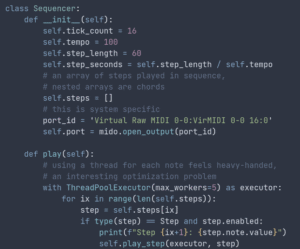I’ve always thought it would be cool to be able to compose music in code. There are some languages out there that do this, but I was more interested in direct midi programming than in a DSL for composing music. Enter mido.
mido is a midi library for Python that wraps the lower-level midi library python-rtmidi in a friendlier API. It can do a lot of things, but I was primarily interested in using code to control a synth in Bitwig Studio. I ended up writing a little step sequencer API. I used to love playing with Seq 303 back in the 90s, and that’s sort of what I had in mind in terms of how to model midi notes into a song.
I started by defining a Note class.
# note.py
import mido
class Note:
# http://bradthemad.org/guitar/tempo_explanation.php
LENGTHS = {
'w': 240,
'h': 120,
'q': 60,
'e': 30,
's': 15,
't': 7.5,
'dq': 90,
'de': 45,
'ds': 22.5,
'tq': 40,
'te': 20,
'ts': 10
}
# what is the equivalent of '1' numeric duration value
DURATION_MULTIPLIER = LENGTHS['q']
def __init__(self, value:int, duration, multiplier=1, velocity:int=64):
self.value = value
self.duration = duration
self.multiplier = multiplier
self.velocity = velocity
# Converts a note length value like dotted eighth to a value
# in seconds based on default or provided bpm tempo.
# Length abbrs: w, h, q, e, s, t, dq, de, ds, tq, te, ts
# (whole/half/quarter/eight/sixteenth/32nd, dotted/triplet)
def seconds(self, tempo:int):
if type(self.duration) == str:
if self.duration in Note.LENGTHS:
len = Note.LENGTHS[self.duration]
return len * self.multiplier / tempo
else:
return 0
else:
return self.duration * Note.DURATION_MULTIPLIER / tempo
# Returns mido "note_on" message
def get_on(self):
print(f"On {self.value} {self.duration}")
return mido.Message('note_on', note=self.value,
velocity=self.velocity)
# Returns mido "note_off" message
def get_off(self):
print(f"Off {self.value} {self.duration}")
return mido.Message('note_off', note=self.value)And then a basic sequencer to play them.
# sequencer.py
import concurrent
from concurrent.futures import ThreadPoolExecutor
import mido
from threading import Thread
import time
from note import Note
class Step:
def __init__(self, value:int, duration:int=1, start_tick:int=0):
self.enabled = True
self.start_tick = start_tick
self.adjust_duration_for_start_tick = True
self.note = Note(value, duration)
class Sequencer:
def __init__(self):
self.tick_count = 16
self.tempo = 100
self.step_length = 60
self.step_seconds = self.step_length / self.tempo
# an array of steps played in sequence,
# nested arrays are chords
self.steps = []
# this is system specific
port_id = 'Virtual Raw MIDI 0-0:VirMIDI 0-0 16:0'
self.port = mido.open_output(port_id)
def play(self):
# using a thread for each note feels heavy-handed,
# an interesting optimization problem
with ThreadPoolExecutor(max_workers=5) as executor:
for ix in range(len(self.steps)):
step = self.steps[ix]
if type(step) == Step and step.enabled:
print(f"Step {ix+1}: {step.note.value}")
self.play_step(executor, step)
elif type(step) == list:
print(f"Step {ix+1}: {self.chord_str(step)}")
for substep in step:
self.play_step(executor, substep)
time.sleep(self.step_seconds)
def play_step(self, executor, step):
future = executor.submit(note_player, self, step)
future.add_done_callback(note_finished)
def chord_str(self, steps):
return [step.note.value for step in steps]
def note_player(seq:Sequencer, step:Step):
applied_length = seq.step_length / seq.tempo
delay_seconds = step.start_tick * ( applied_length ) / seq.tick_count
note_seconds = step.note.seconds(seq.tempo)
if delay_seconds > 0:
time.sleep(delay_seconds)
if step.adjust_duration_for_start_tick:
note_seconds = note_seconds - delay_seconds
seq.port.send(step.note.get_on());
time.sleep(note_seconds)
seq.port.send(step.note.get_off());
return step
def note_finished(future:concurrent.futures.Future):
print(f"Finished: {future.result().note.value}")
And finally, a little celebratory tune.
# tada.py
from sequencer import Sequencer, Step
step1 = Step(60, 1)
step2 = Step(64, 1)
step3 = Step(67, 1)
step4 = Step(72, 1)
step1a = Step(60, 4, 1)
step2a = Step(64, 4, 2)
step3a = Step(67, 4, 3)
step4a = Step(72, 4, 4)
steps = [step1, step2, step3, step4 ]
steps.append([step1a, step2a, step3a, step4a])
seq = Sequencer()
seq.steps = steps
seq.play()Here’s the output of python tada.py.
Step 1: 60
On 60 1
Off 60 1
Finished: 60
Step 2: 64
On 64 1
Step 3: 67
Off 64 1
Finished: 64
On 67 1
Step 4: 72
On 72 1
Off 67 1
Finished: 67
Step 5: [60, 64, 67, 72]
Off 72 1
Finished: 72
On 60 4
On 64 4
On 67 4
On 72 4
Off 60 4
Finished: 60
Off 64 4
Finished: 64
Off 67 4
Finished: 67
Off 72 4
Finished: 72And here’s what it sounds like running through the Bitwig Organ.
If you want to run this locally, you’ll need a midi device to convert the midi notes into sound. For me, that is Bitwig Studio. It might just work using the built-in software synth on Windows, but I haven’t tried it.
You’ll also need to install some python packages. Here’s the requirements.txt.
mido
python-rtmidi
importlib_metadataAnd here are shell commands to create a virtual environment, install these requirements, and run the program (I’m using bash).
mkdir midosequencer
cd midosequencer
python -m venv .venv
source .venv/bin/activate
pip install -r requirements.txt
python song.pyThis was a fun little project. It was interesting to realize how conceptual music time has to be converted into literal time, down to when each note should stop and start, calculated from tempo and note length — something humans do without thinking about it. It also makes me curious how real sequencers like Bitwig handle concurrency and timing.

